NOVEMBER 1- TODAY’S READING FROM THE ONE YEAR BIBLE- EZEKIEL 1:1-3:15; HEBREWS 3:1-19; PSALMS 104:1-23; PROVERBS 26:24-26
TODAY’S READING FROM THE OLD TESTAMENT- EZEKIEL 1:1-3:15
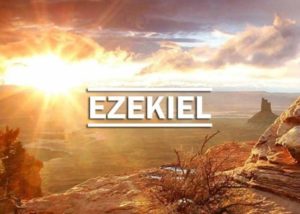 Jeremiah was known as ‘the weeping prophet’ because he prophesied and lived to see the destruction of Jerusalem and the exile into Babylon, which marked the beginning of the times of Gentile domination.
Jeremiah was known as ‘the weeping prophet’ because he prophesied and lived to see the destruction of Jerusalem and the exile into Babylon, which marked the beginning of the times of Gentile domination.
Ezekiel was a contemporary of Jeremiah but much younger. It is likely that Jeremiah had already begun prophesying when Ezekiel was born.
Ezekiel would be primarily ‘a prophet of hope’. But Ezekiel also saw that there was light at the end of the dark tunnel. He recognized that the righteousness of God had brought judgment upon Israel and Judah. His ministry would be to those who were exiled in Babylon. They were paying the price for their idolatry and rejection of Yahweh. However he saw clearly that the original purpose of God for His people would one day be restored. Few believed his words until they heard that Jeremiah’s predictions about the destruction of the temple in 587 B.C. had come true.
Ezekiel was either preparing to serve or already serving as a priest in Jerusalem when he was taken into captivity in 597 B.C. (2 Kings 24:10-14). Daniel had already been in Babylon for 8 or 9 years (605 B.C.). While serving in the temple, Ezekiel managed to separate himself from the religious evil and idolatry that was being practiced.
The first three verses of the book (Ezekiel 1:1-3) can be regarded as the title page. We are given the details concerning the book’s author, Ezekiel, and the time and place when he received the word of the Lord.
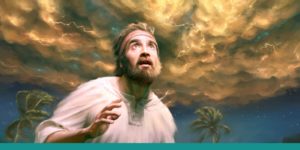 Ezekiel 1:1 1 Now it came about in the thirtieth year, on the fifth day of the fourth month, while I was by the river Chebar among the exiles, the heavens were opened and I saw visions of God.
Ezekiel 1:1 1 Now it came about in the thirtieth year, on the fifth day of the fourth month, while I was by the river Chebar among the exiles, the heavens were opened and I saw visions of God.
Some believe that ‘the thirtieth year’ refers to Ezekiel’s age. However, writers did not usually date material by their own date of birth but rather linked their writings to pivotal historical events. Some scholars believe that the most likely significant date would be the date of the discovery of the law in the temple under the reign of Josiah (622 BC-621 B.C.). Ezekiel was called to the prophetic ministry in the fifth year of the exile (Ezekiel 1:2), which would have been 593/592 BC, thirty years after the discovery of the law and Josiah’s reforms.
Isaiah was prepared for prophetic ministry by seeing the glory of the Lord on the throne and His train filling the temple (Isaiah 6:10; John 12:41). Jeremiah was prepared for ministry by the Word of the Lord coming to Him and touching his mouth (Jeremiah 1:9). Daniel was prepared as God gave him knowledge, intelligence, and understanding of visions and dreams by means of the Spirit (Daniel 1:17). Ezekiel is prepared for his prophetic ministry by receiving visions of the glory of God.
The Lord contrasts the false prophets, who prophesy out of their imagination, with His true prophets who stood in His council to both see and hear His Word (Jeremiah 23:18). Ezekiel would have visions of God (Ezekiel 1:1). God granted Ezekiel the ability to perceive truths about divine operations through marvelous imagery. The visions of God were followed by the voice of God. The phrase “The Word of the Lord came unto me” (Ezek 24:15) occurs 49 times in the Book of Ezekiel.
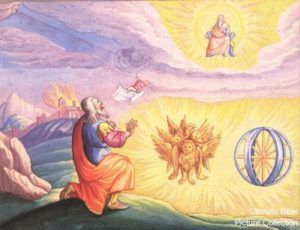 Ezekiel was called to both see and hear the Word of God. The visions of the glory of God will take place in different locations throughout the Book. This, in itself, has some prophetic significance. First, the glory of God appears at the place of Ezekiel’s commission by the River Chebar in Babylon (Ezekiel 1-7). Ezekiel might have been asking, “God, where are You?”. The Lord was saying, “I am here.”
Ezekiel was called to both see and hear the Word of God. The visions of the glory of God will take place in different locations throughout the Book. This, in itself, has some prophetic significance. First, the glory of God appears at the place of Ezekiel’s commission by the River Chebar in Babylon (Ezekiel 1-7). Ezekiel might have been asking, “God, where are You?”. The Lord was saying, “I am here.”
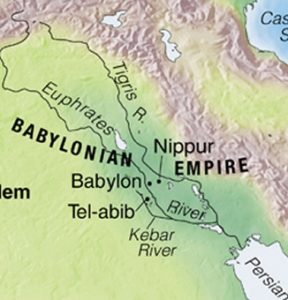 The next vision of the glory of God is when Ezekiel sees the shekinah glory of the Lord slowly and reluctantly, departing from the temple at Jerusalem (Ezekiel 8-11). Then will come the visions of judgment followed by restoration, with the glory of God arriving from the Mount of Olives and filling the temple (Ezekiel 12-43:5).
The next vision of the glory of God is when Ezekiel sees the shekinah glory of the Lord slowly and reluctantly, departing from the temple at Jerusalem (Ezekiel 8-11). Then will come the visions of judgment followed by restoration, with the glory of God arriving from the Mount of Olives and filling the temple (Ezekiel 12-43:5).
It could be that when the Babylonians attacked Jerusalem in 597 B.C., Ezekiel was twenty-five years old. If that is the case, he would be preparing to serve as a priest in the magnificent temple built by King Solomon. Priests were not permitted to serve until they were thirty years old. Imagine how the prospects of his life work changed when he was suddenly made a slave of Nebuchadnezzar and transported to Babylon with ten thousand other captives!
2 Kings 24:10-14 10 At that time the servants of Nebuchadnezzar king of Babylon went up to Jerusalem, and the city came under siege. 11 And Nebuchadnezzar the king of Babylon came to the city, while his servants were besieging it. 12 Jehoiachin the king of Judah went out to the king of Babylon, he and his mother and his servants and his captains and his officials. So, the king of Babylon took him captive in the eighth year of his reign. 13 He carried out from there all the treasures of the house of the LORD, and the treasures of the king’s house, and cut in pieces all the vessels of gold which Solomon king of Israel had made in the temple of the LORD, just as the LORD had said. 14 Then he led away into exile all Jerusalem and all the captains and all the mighty men of valor, ten thousand captives, and all the craftsmen and the smiths. None remained except the poorest people of the land.
At the time of Ezekiel receiving his calling, Jeremiah is still in Judah preaching to the poor folks that remained behind, and Daniel is serving in Nebuchadnezzar’s court. God is merciful in that He is still speaking to His people and through His people as they are spread out during this difficult time.
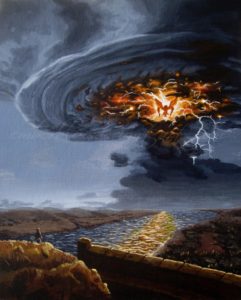 Ezekiel’s calling begins with the ‘visions of God’ (Ezekiel 1:1). By the river Chebar in Babylon, Ezekiel has a vision of God’s glory. A cloud surrounded by brightness is swept into his sight by a stormy wind from the north. In the midst of this glowing cloud, Ezekiel sees four living beings, each with human form, each moving together with the other in rhythmic unity, each one having four faces. Each had the face of a man looking outward to the front, the face of a lion looking outward on the right, and an ox on the left. Each also had the face of an eagle. Like other manifestations of the cherubim in the Old Testament, each of them had wings and the hands of a man. Their wings touched one another. Their legs were straight, and their feet looked like the hooves of calves, though gleaming like burnished bronze.
Ezekiel’s calling begins with the ‘visions of God’ (Ezekiel 1:1). By the river Chebar in Babylon, Ezekiel has a vision of God’s glory. A cloud surrounded by brightness is swept into his sight by a stormy wind from the north. In the midst of this glowing cloud, Ezekiel sees four living beings, each with human form, each moving together with the other in rhythmic unity, each one having four faces. Each had the face of a man looking outward to the front, the face of a lion looking outward on the right, and an ox on the left. Each also had the face of an eagle. Like other manifestations of the cherubim in the Old Testament, each of them had wings and the hands of a man. Their wings touched one another. Their legs were straight, and their feet looked like the hooves of calves, though gleaming like burnished bronze.
 Ezekiel notices that the faces of the living creatures did not turn when they moved, and when they moved, they moved only to follow the Spirit, never turning their bodies as they went. When they stopped moving, they folded their wings inward. In the midst of the living beings, Ezekiel noticed something that looked like burning coals and what resembled torches of fire passing like lightning flashes between the living beings. And the living beings ran to and fro with lightning speed.
Ezekiel notices that the faces of the living creatures did not turn when they moved, and when they moved, they moved only to follow the Spirit, never turning their bodies as they went. When they stopped moving, they folded their wings inward. In the midst of the living beings, Ezekiel noticed something that looked like burning coals and what resembled torches of fire passing like lightning flashes between the living beings. And the living beings ran to and fro with lightning speed.
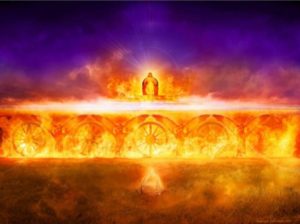 Beside each living being are wheels that touch the earth, and there appeared to be one wheel within the other. Somehow these appear to represent the workings of God, a vehicle for the manifestation of God’s glory. The rims of the wheels were full of eyes. The Spirit of the living beings was in the wheels, and the wheels moved directly in tandem with the living beings. Spread out over the heads of the living beings was an expanse like the awesome gleam of crystal, and beneath the expanse were the outstretched wings of the living creatures. The upper wings of the creatures stretched out straight, touching the wings of the others, and with their side wings, each creature covered their body. The wings made a sound like Niagara Falls, mighty waters, like the voice of the Almighty, or like the sound of a tumultuous army whenever they were moving in flight. When the living beings stopped moving, they folded their wings into their sides and were silent, submitting to a voice that came from above the expanse over their heads.
Beside each living being are wheels that touch the earth, and there appeared to be one wheel within the other. Somehow these appear to represent the workings of God, a vehicle for the manifestation of God’s glory. The rims of the wheels were full of eyes. The Spirit of the living beings was in the wheels, and the wheels moved directly in tandem with the living beings. Spread out over the heads of the living beings was an expanse like the awesome gleam of crystal, and beneath the expanse were the outstretched wings of the living creatures. The upper wings of the creatures stretched out straight, touching the wings of the others, and with their side wings, each creature covered their body. The wings made a sound like Niagara Falls, mighty waters, like the voice of the Almighty, or like the sound of a tumultuous army whenever they were moving in flight. When the living beings stopped moving, they folded their wings into their sides and were silent, submitting to a voice that came from above the expanse over their heads.
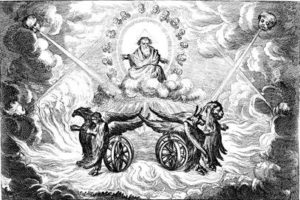 Above the expanse that Ezekiel described as having the awesome gleam of crystal, he sees something resembling a throne, and upon that throne is seated a figure with the appearance of a man.
Above the expanse that Ezekiel described as having the awesome gleam of crystal, he sees something resembling a throne, and upon that throne is seated a figure with the appearance of a man.
Is this the creation of a Stephen Spielberg-like imagination for science fiction? No. Ezekiel is describing the best that he can with the human language available to him what he is seeing, much like the apostle John when he has his visions on the island of Patmos. The Apostle Paul said that when he was caught up to the third heaven, he heard ‘inexpressible words of which men are not permitted to speak’. We can only imagine what he saw! (2 Corinthians 12:4).
What was he seeing? He tells us in verse 28b:
Ezekiel 1:28 Such was the appearance of the likeness of the glory of the LORD. And when I saw it, I fell on my face and heard a voice speaking.
Ezekiel is describing as accurately as possible the heavenly vision that accompanied his commissioning as prophet. The vision is unforgettable. It is God-given, and therefore significant and profitable for us, even if we may not understand it all at the present moment. God is in control.
This all-seeing chariot within a storm cloud operated by a Spirit-driven team of multi-faceted living beings seemed to be upholding and submitting to the throne above them and the One who sat on it.
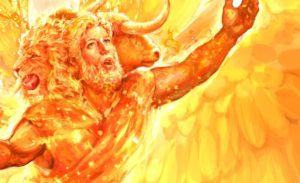 The spiritual beings who were part angel, part human, part animal, could be seen as fitting representatives of the whole created order. Their activity affirmed the relationship that God has designed to have with His creation. He works all things according to the counsel of His will.
The spiritual beings who were part angel, part human, part animal, could be seen as fitting representatives of the whole created order. Their activity affirmed the relationship that God has designed to have with His creation. He works all things according to the counsel of His will.
The four wheels rendered possible the movement of God’s manifestation of glory on the earth, and the upper wings rendered possible the upward movement.
The language conveys that above all that takes place on the earth, there are operations invisible to the natural eye. Above the creation, there is the Creator sitting on the throne, bearing the appearance of a man. He is the Controller of the universe, and He is coming in righteous judgement among His chosen people and the nations. Yet this judgement is tempered by mercy, in that there is the symbol of God’s covenant promise in the rainbow that is in the cloud.
Ezekiel 1:28a 28 As the appearance of the rainbow in the clouds on a rainy day, so was the appearance of the surrounding radiance.
In Chapter 2, we hear the words by which Ezekiel is commissioned. As is customary, a vision of the glory of God knocks one off their feet or at least demands that one takes off their shoes. Ezekiel fell on his face.
The Lord calls Ezekiel to stand up so He can speak to him. What we read next is very instructive. “As He spoke to me the Spirit entered me and set me on my feet and I heard Him speaking to me” (Ezekiel 2:1-2). Doesn’t that describe well the Spirit’s enabling power that comes through God’s Word? May the all-sufficient Word fill us with the Spirit and enable us to stand, to hear, and obey the revealed will of God.
Ezekiel’s commission, like that of the other prophets, would not be easy. He would need to guard his heart so that he would not be complicit with the rebellion that raged in the hearts of his compatriots.
Ezekiel is given prophetic parables to act out. He is given a scroll to eat. He is to devour it and then speak to the house of Israel. He is forewarned:
Ezekiel 3:7-9 7 yet the house of Israel will not be willing to listen to you, since they are not willing to listen to Me. Surely the whole house of Israel is stubborn and obstinate. 8 “Behold, I have made your face as hard as their faces and your forehead as hard as their foreheads. 9 “Like emery harder than flint I have made your forehead. Do not be afraid of them or be dismayed before them, though they are a rebellious house.”
Ezekiel experiences the power of the vision that he saw lifting him up, speaking of God’s intention- “May the glory of the Lord be praised in His dwelling place!” (3:12). The Holy Spirit fortifies him for the hard ministry that lies ahead.
TODAY’S READING FROM THE NEW TESTAMENT – HEBREWS 3:1-19
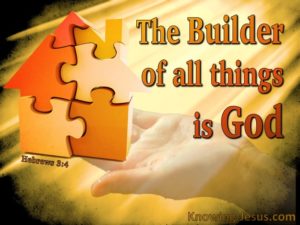 The writer of Hebrews sets forth once again the supremacy of Jesus. He is the better apostle (‘sent one’) and the better priest. He calls us his brothers and partners in the heavenly calling. Moses was a partner in God’s heavenly calling, but only in that he was a type of what was to come, only as he gave the menu of which Christ would be the meal. The builder of the house has greater honor than the house itself. Moses had a place in the building plan, and so do we, “if we hold fast to our courage and the hope of which we boast.” In other words, if we regress under the pressure of persecution to go back to the old religion of shadows instead of boldly identifying with Christ, we have not understood the gospel. We have not understood that Jesus is the builder.
The writer of Hebrews sets forth once again the supremacy of Jesus. He is the better apostle (‘sent one’) and the better priest. He calls us his brothers and partners in the heavenly calling. Moses was a partner in God’s heavenly calling, but only in that he was a type of what was to come, only as he gave the menu of which Christ would be the meal. The builder of the house has greater honor than the house itself. Moses had a place in the building plan, and so do we, “if we hold fast to our courage and the hope of which we boast.” In other words, if we regress under the pressure of persecution to go back to the old religion of shadows instead of boldly identifying with Christ, we have not understood the gospel. We have not understood that Jesus is the builder.
The writer makes it clear that just as there were those in Israel’s history who shrunk back in unbelief and never entered the promised land, so it is possible that some of them could fall short of entering into the salvation that God had promised.
Hebrews 3:12 12 Take care, brethren, that there not be in any one of you an evil, unbelieving heart that falls away from the living God.
What is the antidote to unbelief? Belief in the gospel. The writer asks that they encourage each other with the truth of the gospel (3:13).
TODAY’S READING FROM THE BOOK OF PSALMS – PSALMS 104:1-23.
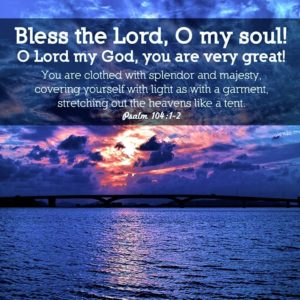 Once again, as we saw yesterday reading Psalm 103, the Psalmist is encouraging himself in the Lord.
Once again, as we saw yesterday reading Psalm 103, the Psalmist is encouraging himself in the Lord.
He is speaking to himself with a psalm, a hymn, and a spiritual song. “Bless the Lord, O my soul!”
The Psalmist reminds his soul of the Lord’s greatness. First, he considers who God is: Majestic! Full of splendor! Wrapped in light! We see Him as Creator of the heavens and the earth (104:3b).
You will notice that Psalm 104:4 is quoted in what we read yesterday in the Book of Hebrews, concerning the angels, described as winds and flaming fire. The angels are in the service of our great God and King.
Psalm 104:4 4 He makes the winds His messengers, Flaming fire His ministers. (See Hebrews 1:7)
He forms the earth and has the waters flow over the mountains into the places that He assigned for them. (v.8). He is behind all geology and geography. Not only is He Lord over the seas (oceanography), but He is also the Lord who provides food and drink to all creation, the Lord of every eco-system. He is the God of ecology.
He orders the position of the earth as it rotates on its axis, giving us day and night. He knows what we need for our work and for our rest. Mankind can manipulate his daylight-saving times, but God has authored our soul and body saving time. It is far better that we adjust to His reality than anything else.
Praise the Lord, O my soul!
TODAY’S READING FROM THE BOOK OF PROVERBS – PROVERBS 26:24-26
Proverbs 26:24-26 24 He who hates disguises it with his lips, but he lays up deceit in his heart. 25 When he speaks graciously, do not believe him, for there are seven abominations in his heart. 26 Though his hatred covers itself with guile, His wickedness will be revealed before the assembly.
Beware duplicity and fake smiles.
PRAY FOR THE NATIONS- We have been praying for South Africa.
(from Prayercast.com)
Known as the “rainbow nation,” a reference to the many ethnicities that make up the population, the nation of South Africa has a long history marked by inter-racial relations. Originally inhabited by Bantu speaking tribes, Dutch traders established a settlement in 1652, and the British arrived in 1806, eventually colonizing South Africa. In 1948 the government implemented a policy of apartheid, which legalized racial segregation and discrimination. The first multi-racial elections took place in 1994, yet the national identity continues to be formed from a struggle between different groups who have come together as one nation. Much fragmentation remains. The nation faces not only great ethnic tension but also high murder rates, corruption, crime, and an HIV/AIDS epidemic.
South Africa is a young nation: one-third of the population is under 15, and 70% is under 35. It is also a middle-income nation that composes 40% of Sub-Saharan Africa’s GNP. Traditionally an economy of agriculture, livestock, and mining, a large financial industry, and tourism are developing as well. Yet corruption, HIV/AIDS, high crime rates and high unemployment and poverty rates all adversely affect the economy.
Traditionally a religious country, three out of every four claim to be Christian, and these numbers are slowly increasing. There are many mainline and smaller independent churches. The charismatic population has seen phenomenal growth and makes up nearly a quarter of the population; the Pentecostal movement has grown from 400,000 in 1960 to 6.3 million in 2010. However, much nominalism exists, especially in the mainline denominations. The church is on the frontline of confronting the nation’s challenges; there has been a large response to the HIV/AIDS epidemic, ministries to the poor and disadvantaged, and work on racial reconciliation. Yet healing is needed between the various cultures and churches. Spiritual training for the leaders of the various African independent churches is also needed.
PRAYER: Lord, we are grateful for a more sure word of prophecy, that we can perceive Your glory and receive the grace and knowledge of Who You are through Your Son, the Living Word. We ask Lord that You would continue to speak to us through Your Word, convicting us, challenging us, correcting us, and strengthening us. We want to cooperate with Your Holy Spirit’s energizing power and bring glory to Your Name. Help us to hold fast to the courage and the hope of which we boast! In Jesus’ Name. Amen.
Pastor David
